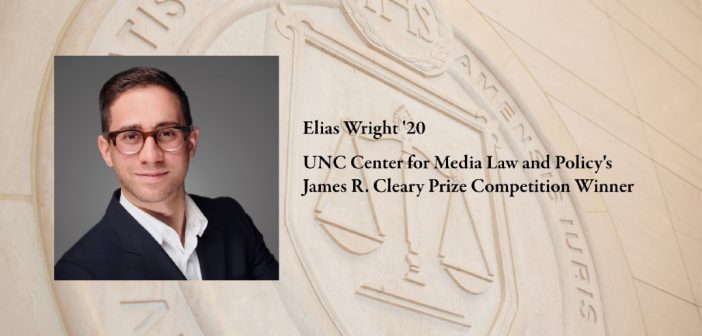Recent graduate Elias Wright ’20 was awarded first place and a prize of $1,000 in the UNC Center for Media Law and Policy’s second annual James R. Cleary Prize competition for his student note, “The Future of Facial Recognition Is Not Fully Known: Developing Privacy and Security Regulatory Mechanisms for Facial Recognition in the Retail Sector.” Prizes are awarded to three authors of published scholarly papers that most creatively and convincingly propose solutions to significant problems in the field of media law and policy.
Wright’s note focused on facial recognition technology—specifically examining how private sector biometric technologies play a role in the wider legal understanding of privacy implications. Wright argued that consumer sensitivities and the opaque nature of the technology have resulted in over- and under-inclusive regulatory regimes. In turn, he proposed that the broad implications of biometric privacy harms justify more extensive privacy regulation than a narrow focus on data security and self-regulation.
“What drew me to this topic was understanding how a legal system should be developed from the ground up for a new issue that demonstrates complexity and difficulty when creating any strong legal regime,” Wright explained. “I was really interested in federal agency powers that already existed—specifically the Federal Trade Commission—and reviewed what powers it has and what the potential limitations of its power are.” He also said serving as a project fellow at the Center of Law and Information Policy during his 1L year significantly increased his interest in the privacy space and how the law was involved in questions related to technology, such as facial recognition. Wright added that Professor Olivier Sylvain, who was his note advisor, and Sylvain’s Information Law course were major contributors to his understanding and passion for the field.
Receiving word about his win earlier this month was a pleasant surprise, according to Wright, especially considering that he submitted his note for competition in February—“when the world was in a different place,” he said. “In this work-from-home environment, everything you receive and send is through email and you can sometimes get a daunting feeling about emails coming in,” Wright continued. “But when it’s something good, like this, it’s a great feeling and it really puts you in a good place.”
The note was also published in the Fordham Intellectual Property, Media and Entertainment Law Journal in late March of 2019 and has been downloaded more than 2,230 times to date. “I went into this trying to write something that’s forward-looking and trying to determine what emerging issues will need to be resolved at a future point,” Wright said. “To have that many downloads is an awesome feeling. People are actually reading my thoughts on this. Maybe this can influence policy, or maybe someone who actually has more control over these levers of power might come across this.”
Wright is currently working as a law clerk at Katten Muchin Rosenman LLP.




